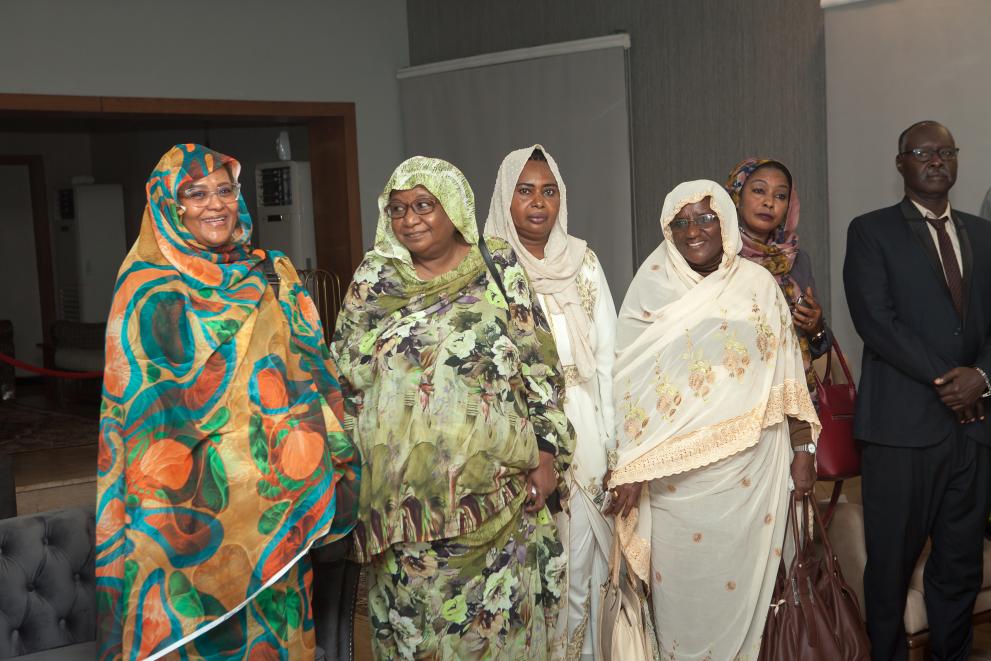On 3 October, Sudan's civilian-led Transitional Government and the Sudan Revolutionary Movements signed a Peace Agreement aimed at ending decades of war in which hundreds of thousands have died. This historic agreement will pave the way for inclusive and comprehensive peace in Sudan.

On 3 October, Sudan's civilian-led Transitional Government and the Sudan Revolutionary Movements signed a Peace Agreement aimed at ending decades of war in which hundreds of thousands have died. This historic agreement will pave the way for inclusive and comprehensive peace in Sudan.
Sudanese women activists excited to be able to attend the signature ceremony of the Sudan Peace Agreement in Juba on 3 October, thanks to EU support
At the request of the Sudanese National Peace Commission, the European Union facilitated the participation of community representatives from the conflict-affected areas of South and West Kordofan and Blue Nile at the signature ceremony of the peace agreement in Juba, South Sudan. The EU’s support was made possible under its Instrument contributing to Stability and Peace (IcSP).
Community representatives at Khartoum airport before boarding the plane to Juba for the signing ceremony
Since the civilian-led Government took office in early September 2019, the EU has provided support to consolidate the transition to democracy. This is focused on two main objectives: to help bridge the divide between Sudan’s centre and neighbouring regions and to help reform and reinforce the country’s counter-terrorism structures. Concrete actions on the ground in these two key areas are implemented through the Centre for Humanitarian Dialogue (HD) and the United Nations Office of Counter-Terrorism (UNOCT).
Awatif Farha AlDien AlShiekh, an activist from Blue Nile State, before leaving for the signing ceremony in Juba.
The signing of the Sudanese peace agreement earlier this month concluded a negotiation process of almost one year, facilitated and hosted by the South Sudanese government. When the COVID-19 pandemic made in-person meetings and travel impossible, the European Union Delegations in Sudan and South Sudan hosted the different parties in their premises and provided them with videoconference facilities to enable negotiations to continue.
Hatim Badien, Country Project Manager Sudan, Centre for Humanitarian Dialogue (HD) discussing with community representatives before leaving for the signature ceremony of the Peace Agreement in Juba.
In a video message, the EU’s High Representative for Foreign Affairs and Vice President of the Commission, Josep Borrell, encouraged the two groups who have not joined the peace agreement yet, the Sudan People’s Liberation Movement-North-Abdalaziz Al-Hilu and the Sudan Liberation Movement-Abdul Wahid Al-Nur, to “follow and engage in serious negotiations with the Transitional Government.” Borrell also emphasised the importance of the agreement to all Sudanese.
The peace agreement covers a number of issues, from land ownership, reparations and compensation, to wealth and power sharing and the return of refugees and internally displaced people. The former rebel groups are to be dismantled and incorporated into joint units with the national armed forces.
“We emphasise on the correct implementation of the Agreement. As Sudan and the whole world is witnessing today, this is our moment to celebrate, but we hope other armed groups will join to make a comprehensive peace,” Al Fateh Yousif Al Mac Hassan Adlan, a community representative from Blue Nile, said before boarding the plane to Juba.
The European Union supported the journey for community representatives to take part in the signing ceremony. This was made possible thanks to the ongoing project ‘Supporting a Peaceful and Inclusive Transition in Sudan,’ funded under the Instrument contributing to Stability and Peace (IcSP) and implemented by the Centre for Humanitarian Dialogue (HD).
Overall, the EU has provided more than €88 million in development assistance to support political and economic reforms and to create stability and peace in Sudan. Several EU-funded projects are currently under way and contribute to creating social cohesion and peacebuilding among conflict-affected communities, increasing resilience and contributing to inclusive transition, and strengthening women and youth-led approaches to reconciliation and conflict prevention. In addition, the EU recently signed a €92.2 million agreement with the World Bank to support the country in establishing a modern social protection system.
Read more about the Instrument contributing to Stability and Peace.
